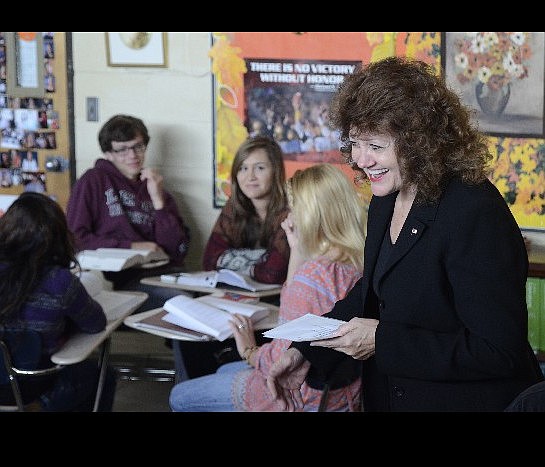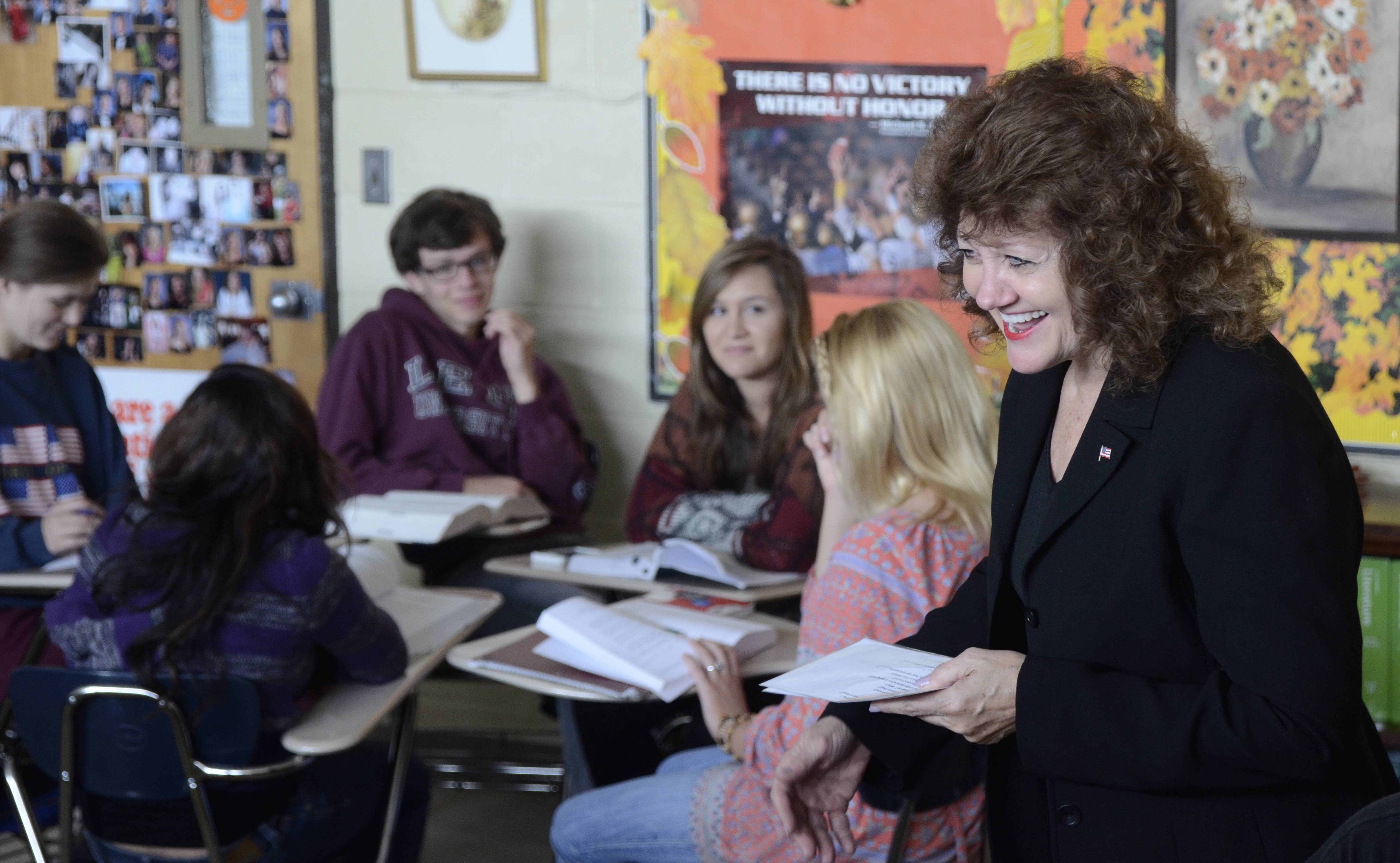WHAT IS COMMON CORE?The Common Core State Standards are a set of academic benchmarks adopted by 45 states and the District of Columbia designed to lay out which concepts students should master. They were created by the National Governors Association and the Council of Chief State School Officers to establish a consistent set of standards for students rather than relying on varying state standards.THE TESTSTeachers have complained that they are in the midst of a transition to the new Common Core State Standards, yet still will be tested on old standards this school year on the TCAP, or Tennessee Comprehensive Assessment Program.But state officials say they are working to narrow the TCAP tests to include only content from the Common Core."If you teach Common Core, you will cover everything that is on the TCAP," said Emily Barton, assistant commissioner of curriculum and instruction.Any gap that does exist should disappear by the 2014-15 school year, when the state switches from paper TCAP tests to a new online assessment aligned with Common Core standards. That testing system was created by a group called the Partnership for Assessment of Readiness for College and Careers, or PARCC. Like the Common Core, it is a consortium of states -- in this case, 19 including Tennessee -- that educate about 22 million students.Georgia schools were also involved in PARCC, but officials announced in July that the state would create its own, less expensive assessments.
In Linda Sparks' English classes, there's no hiding or ducking out. Everybody participates.
"Everybody's on high alert that you're going to be called on," said the Soddy-Daisy High School teacher. "It's not just the brainy kid that knows all the answers."
Sparks says that shift, in which every student takes part in classroom discussion and debate, is partially thanks to Tennessee's shift to the Common Core State Standards, new benchmarks that outline the concepts students are expected to learn. She's a 33-year teaching veteran and plans to retire at the end of this school year. So she's seen plenty of educational reforms, fads and fixes come and go.
But she said Common Core feels different. It has the potential to be a game-changer, she said.
"This is something that you can use equally as well in a chemistry class, a history class or a mathematics class," Sparks said.
One of Common Core's objectives is to break down barriers between subjects. For instance, teachers are encouraging students in math class to write about problems rather than merely turn in a row of numbers.
Tennessee and Georgia adopted the standards in 2010 and have been phasing them in over the past three years. In the 2011-12 school year, most Tennessee districts started using the Common Core standards in kindergarten through second grade. Last year, according to the state education department, school districts used the Common Core math standards in grades 3-8, and about half of the state's districts took part in a program to pilot the language arts standards.
This year, for all the promotion and criticism that Common Core has received, the standards are now fully in use in Tennessee public school classrooms. The shift marks the biggest and most widespread change in America's public schools since the monumental No Child Left Behind law was ushered in more than a decade ago.
The Common Core grew out of concerns from educators around the country that American students' performance on international tests lagged far behind their peers in countries like Singapore and South Korea. The National Governors Association and the Council of Chief State School Officers commissioned experts to devise new standards for math and English that would be based on research and would prepare students for college and careers.
Proponents say the Common Core is better than previous standards in many states because it emphasizes problem-solving and collaboration -- skills students will need in the workplace. In many states, students will delve more deeply into fewer topics, allowing more time for them to grasp concepts.
But critics have become increasingly vocal.
In September the state Senate Education Committee held two days of hearings on the new standards, setting up a potentially contentious battle over whether Tennessee will stick with the Common Core. Speakers complained that the standards were part of an effort by the federal government to collect extensive data on students, and that they represented a threat to states' rights.
Last month, several Bradley County commissioners voiced opposition to the standards, with one describing them as "cookie cutter." Commissioners voted to ask the board of education to work up a report on the standards' impact in local classrooms.
Across the country, some opposed the standards for being too lax while others said the Common Core might be too rigorous for struggling students.
While the standards themselves are new, some teachers say the philosophy behind them is old hat. Several of Hamilton County's magnet schools have built their success on teaching strategies that rely heavily on project-based learning and student-led instruction.
"It's nothing new necessarily, because everything's based on well-researched methods," said Hixson High English teacher Rebecca Aslinger. "Some teachers have been doing these things and some haven't."
In English classes, Common Core standards have gained attention because they require more nonfiction reading. That change was tough to swallow for many English teachers, who are used to studying a multitude of classical works of fiction. But Aslinger was a believer long before the transition. Her graduate thesis examined how incorporating nonfiction texts can help improve reading scores.
So her classes, like many others, are incorporating journal articles, newspaper stories and history texts. Aslinger said that move should help better prepare students for life beyond high school.
"It just makes sense," she said. "The real world isn't out of a textbook or a worksheet."
•••
On a recent Friday, Cicely Woodard asked her honors algebra students for their answers on the homework at Nashville's Rose Park Magnet Middle School. But the conversation didn't end with just a number -- even if it was the correct one.
Students had to explain their strategies for reaching particular answers. When one boy realized he had come up with the wrong figure, he and the rest of the class talked about why he was wrong and what he should have done differently.
Woodard then gave her students a problem to work on that had only one solution, but asked them to use two different mathematical strategies to solve the problem. Plus, she asked them to explain their thinking using complete sentences and correct punctuation. In math class.
"It's really exciting to hear them talk and use all of the math terms to explain their thinking and construct arguments," Woodard said.
That kind of instruction isn't entirely a new thing. It's been sprinkled throughout classrooms in the past. But now, it's a near-necessity.
"More of the staff is embracing it," said Debbie Smith, principal at the Chattanooga High Center for Creative Arts. "I see them working very hard trying to get students to deepen their thinking and using processes that haven't always been used in classrooms."
But this sort of teaching requires changes from students, too. Much of the arts curriculum at CCA is performance-based, meaning students grow used to dancing, singing and acting in front of crowds. But even some of CCA's students may need a little adjusting to classwork that requires them to speak up, talk in groups or present to the whole class on a regular basis. Smith says it helps students build skills they'll need in the real world.
"Because you're talking with peers before you present to the class, it builds your self-confidence," she said. "It's a steppingstone."
Still, educators and politicians alike have seen programs, tests and standards come and go. And some are suspicious that Common Core will be just as fleeting as past initiatives.
"I have no confidence that this is it," said state Rep. Joe Pitts, a Democrat from Clarksville. "In fact, I fully expect something else. It's like the latest, greatest shiny thing and it's new, so let's try it."
This story was produced in partnership with The Hechinger Report, a nonprofit, nonpartisan education-news outlet affiliated with Columbia University's Teachers College.
Contact staff writer Kevin Hardy at khardy@timesfreepress.com or 423-757-6249.

